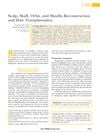 September 2023 in “Nature communications”
September 2023 in “Nature communications” Alk1 in specific cells is crucial for proper nerve branching and hair function.
 August 2021 in “Journal of emerging technologies and innovative research”
August 2021 in “Journal of emerging technologies and innovative research” PRP combined with Ayurvedic medicine may effectively treat hair loss.
 September 2019 in “The journal of investigative dermatology/Journal of investigative dermatology”
September 2019 in “The journal of investigative dermatology/Journal of investigative dermatology” Hair follicles repair 3D injuries using a 2D healing process.
 January 2018 in “International journal of food and nutrition research”
January 2018 in “International journal of food and nutrition research” Intermittent iron and nutritional supplements can help reduce hair loss.
 9 citations,
February 2013 in “Plastic and Reconstructive Surgery”
9 citations,
February 2013 in “Plastic and Reconstructive Surgery” The article explains how to rebuild parts of the head and face and how to transplant hair to cover scars, highlighting the need for careful planning and choosing the right method for each patient.
 5 citations,
August 2018 in “Neurology and Therapy”
5 citations,
August 2018 in “Neurology and Therapy” Hair thinning is a common but generally mild and reversible side effect of teriflunomide in multiple sclerosis patients.
 March 2023 in “Clinical, cosmetic and investigational dermatology”
March 2023 in “Clinical, cosmetic and investigational dermatology” IL-33 is linked to hair follicle damage in psoriasis and could be a treatment target for hair loss in this condition.
 September 2019 in “The journal of investigative dermatology/Journal of investigative dermatology”
September 2019 in “The journal of investigative dermatology/Journal of investigative dermatology” Tet1/2/3 enzymes affect hair follicle cell development by influencing BMP signaling.
 3 citations,
May 2010 in “Nursing Standard”
3 citations,
May 2010 in “Nursing Standard” Treatments for autoimmune hair loss have limited success and often relapse, and emotional support is crucial for those affected.
 11 citations,
July 2017 in “Expert Opinion on Investigational Drugs”
11 citations,
July 2017 in “Expert Opinion on Investigational Drugs” New hair loss treatments may include topical medications, injections, and improved transplant methods.
 9 citations,
January 2014 in “DARU Journal of Pharmaceutical Sciences”
9 citations,
January 2014 in “DARU Journal of Pharmaceutical Sciences” Cuscuta reflexa extracts helped regrow hair in rats with drug-induced hair loss.
 1 citations,
May 2010 in “Nursing Standard”
1 citations,
May 2010 in “Nursing Standard” Treatments for autoimmune hair loss have limited success and patients need emotional support and self-acceptance.
 25 citations,
May 2014 in “Facial Plastic Surgery”
25 citations,
May 2014 in “Facial Plastic Surgery” PRFM may help treat hair loss, especially in mild cases.
 20 citations,
July 1990 in “Pediatrics in Review”
20 citations,
July 1990 in “Pediatrics in Review” The four main causes of hair loss in children are fungal infections, pulling out hair, autoimmune hair loss, and stress-related hair shedding.
 12 citations,
February 2001 in “Annals of Pharmacotherapy”
12 citations,
February 2001 in “Annals of Pharmacotherapy” No effective treatment for hair loss after childbirth was found, but it usually gets better on its own and some cosmetic methods might help.
 8 citations,
January 2012 in “Dermatology”
8 citations,
January 2012 in “Dermatology” The HPV vaccine may be linked to temporary hair loss in children, but the benefits outweigh the risks.
 7 citations,
February 2019 in “International Journal of Dermatology”
7 citations,
February 2019 in “International Journal of Dermatology” Gray hair is caused by reduced melanin production or transfer issues, linked to aging and possibly health conditions, with treatments focusing on color camouflage.
 September 2023 in “bioRxiv (Cold Spring Harbor Laboratory)”
September 2023 in “bioRxiv (Cold Spring Harbor Laboratory)” FOL-026 peptide can help repair blood vessels and promote growth, offering potential treatment for vascular diseases.
 March 2023 in “International Journal of Biomedicine”
March 2023 in “International Journal of Biomedicine” Hair loss from Telogen Effluvium can be managed by treating the underlying cause and may improve with treatments like minoxidil.
 46 citations,
May 2018 in “Dermatologic Surgery”
46 citations,
May 2018 in “Dermatologic Surgery” PRP injections effectively treat hair loss, with positive results in both monthly and every three months treatments.
 5 citations,
September 2010 in “Cancer Prevention Research”
5 citations,
September 2010 in “Cancer Prevention Research” The research suggests new treatments for skin cancer could target specific cell growth pathways.
 3 citations,
June 2023 in “Frontiers in medicine”
3 citations,
June 2023 in “Frontiers in medicine” Oxidative stress may contribute to hair loss in alopecia areata and antioxidants could potentially help as a treatment.
 December 2023 in “EPRA international journal of multidisciplinary research”
December 2023 in “EPRA international journal of multidisciplinary research” Alopecia areata causes sudden hair loss, has genetic links, and can be managed but not cured.
 120 citations,
February 2009 in “Apoptosis”
120 citations,
February 2009 in “Apoptosis” Understanding how cells die in the skin is important for treating skin diseases and preventing hair loss.
 48 citations,
September 2013 in “Oncologist”
48 citations,
September 2013 in “Oncologist” Endocrine therapies for cancer significantly increase the risk of hair loss.
 3 citations,
July 2018 in “Journal of Oral and Maxillofacial Surgery”
3 citations,
July 2018 in “Journal of Oral and Maxillofacial Surgery” Hair loss can occur after oral surgery, likely due to stress and pressure on the scalp, and usually gets better on its own.
 2 citations,
October 2009 in “The FASEB Journal”
2 citations,
October 2009 in “The FASEB Journal” Stress does not greatly speed up aging or hair loss in politicians.
 November 2012 in “South African Family Practice”
November 2012 in “South African Family Practice” The article concludes that early treatment of alopecia is crucial to prevent permanent hair loss.
 13 citations,
June 2018 in “Journal of histochemistry and cytochemistry/The journal of histochemistry and cytochemistry”
13 citations,
June 2018 in “Journal of histochemistry and cytochemistry/The journal of histochemistry and cytochemistry” Laminin-511 may contribute to psoriasis by affecting skin cell growth and survival.
 49 citations,
October 2017 in “Nutrients”
49 citations,
October 2017 in “Nutrients” Equisetum debile extract, especially the ethyl acetate type, may be a promising natural ingredient for anti-hair loss products.






























